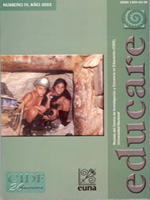Buscando respuestas al reto de la diversidad desde la pedagogía crítica
DOI:
https://doi.org/10.15359/ree.2003-4.2Abstract
Rethinking diversity from the point of view of critical pedagogy constitutes one of the main challenges of contemporary education, given that we all must assume the topic of altering in times of globalization and post-modernism. The same diversity which is present in society, is also a specific factor at school. The problem is that diversity in society is considered as inequality and at school it means diversity, which can mask “pedagogical” inequalities. We must rebuild and rethink school from the diversity for equality under the mandate of compensating inequalities.
References
Delval, Juan(2000) Aprender en la vida y en la escuela, Madrid: Morata.
Flecha, Ramón ( 1999), Aprendizaje dialógico en la era de la información; Gandía: Editorial Movimiento de Renovación Pedagógica.
Forrester,V. (1997), El horror económico, Buenos Aires: Fondo de Cultura Económica.
Galeano, Eduardo ( 1999) La escuela del crimen, Montevideo: Semanario Brecha.
Larrosa, Jorge ( 1995) Escuela, poder y subjetivación, Madrid: Editorial de la Piqueta.
Mardones, J.M. ( 1998), Desafíos para recrear la escuela, Madrid: Editorial PPC.
Morin, Edgar (2000), La cabeza bien puesta. Pensar la refonna, refonnar el pensamiento, Buenos Aires: Editorial Nueva Visión.
Rogero, Julio (2000); Materiales de trabajo para una conferencia,
mimeo, Valencia.
Published
How to Cite
Issue
Section
License
1. In case the submitted paper is accepted for publication, the author(s) FREELY, COSTLESS, EXCLUSIVELY AND FOR AN INDEFINITE TERM transfer copyrights and patrimonial rights to Universidad Nacional (UNA, Costa Rica). For more details check the Originality Statement and Copyright Transfer Agreement
2. REUTILIZATION RIGHTS: UNA authorizes authors to use, for any purpose (among them selfarchiving or autoarchiving) and to publish in the Internet in any electronic site, the paper´'s final version, both approved and published (post print), as long as it is done with a non commercial purpose, does not generate derivates without previous consentment and recognizes both publisher's name and authorship.
3. The submission and possible publication of the paper in the Educare Electronic Journal is ruled by the Journal’s editorial policies, the institutional rules of Universidad Nacional and the laws of the Republic of Costa Rica. Additionally, any possible difference of opinion or future dispute shall be settled in accordance with the mechanisms of Alternative Dispute Resolution and the Costa Rican Jurisdiction.
4. In all cases, it is understood that the opinions issued are those of the authors and do not necessarily reflect the position and opinion of Educare, CIDE or Universidad Nacional, Costa Rica. It is also understood that, in the exercise of academic freedom, the authors have carried out a rogorous scientific-academic process of research, reflection and argumentation thar lays within the thematic scope of interest of the Journal.
5. The papers published by Educare Electronic Journal use a Creative Commons License:














 The articles published by Educare Electronic Journal can be shared with a Creative Commons License:
The articles published by Educare Electronic Journal can be shared with a Creative Commons License: 



